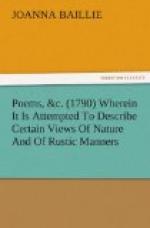“But thou hast left me weak, forlorn,
And chill’d with age’s frost,
To count my weary days, and mourn
The comforts I have lost.
“Unkindly fair! why did’st thou go?
O, had I known the truth!
Tho’ Edward’s father was my foe,
I would have bless’d the youth.
“O could I see that face again,
Whose smile calm’d ev’ry strife!
And hear that voice, which sooth’d my pain,
And made me wish for life!
“Thy harp hangs silent by the wall:
My nights are sad and long:
And thou art in a distant hall,
Where strangers raise the song.
“Ha! some delusion of the mind
My senses doth confound!
It was the harp, and not the wind,
That did so sweetly sound.”
Old Arno rose, all wan as death,
With broken steps of care;
And oft’ he check’d his quick-heav’d
breath,
And turn’d his eager ear.
When like a full, but distant choir
The swelling sound return’d;
And with the soft and trembling wire,
The sighing echoes mourn’d.
Then softly whisper’d o’er the song
Which Marg’ret lov’d to play,
Like some sweet dirge, and sad, and long,
It faintly died away.
His dim-worn eyes to heav’n he cast,
Where all his griefs were known;
And smote upon his troubled breast,
And heav’d a heavy groan.
“I know it is my daughter’s hand,
But ’tis no hand of clay:
And here a lonely wretch I stand,
All childless, bent, and grey.
“And art thou low, my lovely child?
And hast thou met thy doom?
And has thy flatt’ring morning smil’d,
To lead but to the tomb?
“O let me see thee ere we part,
For souls like thine are blest;
O let me fold thee to my heart
If aught of form thou hast.
“This passing mist enrobes thy charms:
Alas, to nought ’tis shrunk!
And hollow strike my empty arms
Against my aged trunk.
“Thou’rt fled like the low ev’ning
breath
That sighs upon the hill:
O stay! tho’ in thy weeds of death,
Thou art my daughter still.”
Loud wak’d the sound, then fainter grew,
And long and sadly mourn’d;
And softly sigh’d a long adieu,
And never more return’d.
Old Arno stretch’d him on the ground,
Thick as the gloom of night,
Death’s misty shadows gather’d round,
And swam before his sight.
He heav’d a deep and deadly groan,
Which rent his lab’ring breast;
And long before the morning shone,
His spirit was at rest.
A REVERIE.
Beside a spreading elm, from whose high boughs
Like knotted tufts the crow’s light dwelling
shows,
Where screen’d from northern blasts, and winter
proof,
Snug stands the parson’s barn with thatched
roof;
At chaff-strew’d door, where, in the morning




